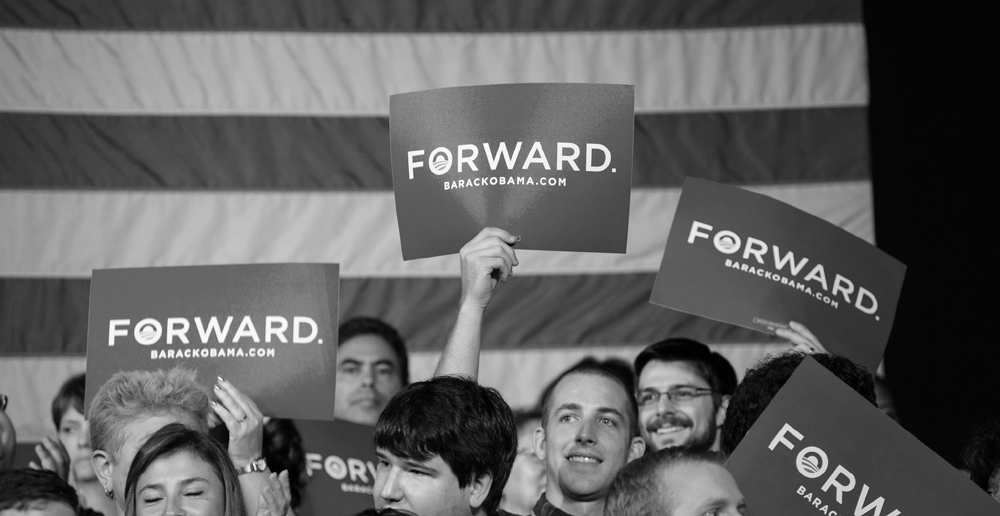Obama 2012: get it done
Explaining the ‘08 to ‘12 change In 2008 the mantra within Senator Obama's campaign for staff and volunteers alike was "Respect - Empower - Include" . In 2012 a fourth word has been added: "Win". This change serves as both metaphor and...
Explaining the ‘08 to ‘12 change
In 2008 the mantra within Senator Obama’s campaign for staff and volunteers alike was “Respect – Empower – Include” . In 2012 a fourth word has been added: “Win”.
This change serves as both metaphor and explanation for just about all the significant changes I’ve noticed between the two campaigns. From field ops in swing states to convention speeches the fourth word categorically trumps the other three with all the resultant changes in style and substance that entails.
And the worse thing is it’s almost certainly necessary for this is a re-election campaign when unemployment is over 8 per cent, wages are still down, cost of living is still up and the national right track/wrong track numbers are weighed heavily against hope.
To answer this Chicago has created a campaign that is even sharper, faster and bigger then ‘08. And it is 100 per cent focused on winning. This is more unusual then you would think because in fact very few campaigns in politics are actually wholly focused on winning. Sure it’s the primary purpose but a campaign represents a genuine balancing act between that primary purpose and other objectives such as:
- electoral mandate: get votes from people and places not necessary for victory but useful for later political capital purposes,
- credibility: make policy promises and attack opponents in a way that meets with the approval of such campaign arbiters as focus group attendees, political professionals and key journalists,
- down-ballot needs: responsibilities to spend time and money helping other candidates,
- advancing causes that the candidate perceives as central to their own personal political purpose: cf: David Miliband’s ‘Movement for Change’ effort or Ed Miliband’s ‘Living Wage’ campaign in their respective leadership races.
Obama 2012 isn’t like that. More then any of the 28 campaigns I have worked or volunteered on over the last 20 years this campaign is the most single-mindedly focused on victory. As one senior Democrat noted in the New Yorker of Obama’s campaign manager: “Jim Messina just cares about getting two hundred and seventy electoral votes—period.”
So not for Chicago the Gore campaign’s moral majority pleadings about the sacred nature of the popular vote or even the begging letters from Democratic congressional leaders with whom Chicago refuses to share funds. No, this campaign is all about putting Obama over the top.
To that end Obama ‘12 is indeed sharper, faster and bigger then Obama ‘08 but I doubt it’s more powerful. After all, things like mandate, credibility, down-ballot wins and public argument victories all make for critical tools in governing. But Chicago has reasoned that that path isn’t open to them this time with the result that the campaign is more conventional when it comes to internal factional briefing (respect?), monitors field organisers’ numbers at the microscopic level (empower?) and places less emphasis on grassroots inclusion in decision making then in ‘08 (include?).
Downgrading the importance of these words and inserting so overtly “win” may not feel pleasant (and may well explain the absence of the originators of the respect-empower-include philosophy Paul Tewes and Steve Hildebrand from Obama ‘12) but the campaign is playing the hand that it’s been dealt and to their immense credit Chicago is winning.
A good example of this is Obama’s acceptance speech at the convention. Whilst considered somewhat lackluster by the Washington DC-NYC media set it received excellent coverage across the swing state media. This coverage came about because the speech (surely the most poll tested and focus-group checked of Obama’s career) did what it needed to do – further mirroring the campaign’s style as a whole. He ticked every box a political winner needs to tick: he defined the choice that voters face (slanted to his narrative advantage), played up the caricature of his opponent’s public image (and losing control of public image can be the worse thing that happens to a politician), made the election about the future not the past (neatly parking the problems of the present) and occupied the political centre ground (with 10,000 “middle class first” placards in the hall advertising his audience and his priority).
Gone too is the single narrative to whole electorate appeal strategy of 2008. Where once Obama offered hope/change to the whole electorate with the currents of demographic micro-targeting rippling beneath the surface now the sub-group divide and conquer strategy is on full, proud display for all too see. As advertised by speaker after speaker at the convention and conveyed by millions of dollars of targeted ad buys and countless hours of volunteer outreach the president will be re-elected by a coalition of women, minority and college educated white with a final dash of blue collar male voters in Ohio.The voter-bloc appeal once implicit is now overt.
This isn’t quite a micro-trends politics beloved of New Labour and the Clintons – but it is overt coalition-building politics that speaks to both the rising electoral power of these blocs and a cold-headed acknowledgement of the president’s limited chance of success with a whole-electorate appeal. The Obama biographer Anthony Painter has previously condemned such strategies as akin to playing with tiny pieces of Lego. At least these groups are large enough to represent Duplo.
So the culture of the campaign has changed since 2008 and yes, that saddens me somewhat, but the focus on winning is surely the right one. After all, I, and millions of other Obama activists, would surely be far more saddened by a President Romney.
